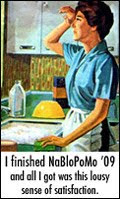A social network is an online community where people can gather, communicate, network, and keep in touch. Two of the most well known communities are Facebook and MySpace. There are many networks on the Web today and they are wildly popular with both Young People and Old People.
Most communities follow the same structure. A user signs up, creates a profile, and adds friends and joins smaller communities. A person can add anyone he or she desires, and another user must confirm or deny his or her request. Many people use these communities to make new friends, find people with similar interests, and lurk persons of interest.
At some point, in my hope to explain and encourage my mother into joining the social networking scene with more vigor, I plan to post in-depth articles examining the specific details regarding social networking sites.
But first, a brief overview over what's out there.
Bebo – Founded in 2005, the name stands for "blog early, blog often." The service is available in the U.S., Canada, United Kingdom, Ireland, Poland, New Zealand, and Australia. Bebo is owned by AOL, who purchased the site in 2008 for $850 million.
Facebook – Privately owned and launched in 2004, Facebook is one of the most notable networks today. The site was set to mirror the tangible campus facebook, and, initially, was only available to college students. Users were required to attend a school Facebook chose to add to its network (I remember waiting, desperately, for it to come to Towson University in fall '04) and needed to provide a campus e-mail, which then needed to be verified. Today the site is available to anyone. And Old People are on it! Hooray for Old People! A film is currently in development detailing the site's creation and subsequent explosion in popularity. Until then, check out Wikipedia for Facebook's long, boring history.
Friendster – Founded in 2002, Friendster is largely regarded as the original modern social network. In the U.S., Friendster has fallen out of favor in the wake of Facebook and MySpace's personality. That said, the service has expanded globally in the last year and continues to thrive. Friendster currently owns four patents related to its services. From VentureBeat:
The patent in question concerns the “compatibility scoring of users in a social network,” or a method for determining how similar social-network users are to each other (abstract below). San Francisco-based Friendster has apparently been granted these patents because it grew big before major rivals and offered many standard social networking features before them too. The previous three patents cover: how people are connected on a social network, the process of friends encouraging each other to upload content, and ways for users to manage social-network friendships.
LinkedIn –LinkedIn is like MySpace for career networking, but without teenage drama, n00dz, animated GIFs, and obscene comments. LinkedIn features a point/percentage system, encouraging its users to complete tasks to meet completion (uploading a photograph, filling in work information, adding friends, uploading resumes, and writing reviews for current and past colleagues). It's considered bad form to add everyone you know to your profile, which, oops, I did when I signed up. Unlike other sites, LinkedIn will show you who looked at your profile and other profiles visitors viewed in addition to yours. (Makes lurking hard!)
MakeOutClub – A hot bed of early ‘00s angst, the site was founded in 2000 to "form bands, start zines, find roommates and to submit user records, photographs and art to the site for everyone to see." The site has declined in popularity, in part to the implosion of newer networks, and possibly of jokes aimed solely at "emo kids."
MySpace – MySpace is Friendster, but more popular, and with young people. Or, that's how it started. Founded by Tom, a default buddy for new users, MySpace has imploded since its start in 2003. The site is especially popular with young people, and has, to my great sadness, founded the demise of band Web sites. MySpace hosts pages for music and other forms of media in addition to individuals. MySpace has fallen under criticism for its safety and appropriation of personal information. (See this section of Wikipedia for more.)
Twitter – Oh, please. We know what Twitter is at this blog! And if not, well, crap, next week's post are mostly Twitter How Tos.
XING – Founded in 2006 as Open Business Club, XING is a global network for professionals.
Additional Resources:
Bebo
Facebook Wikipedia article
Friendster
Friendster nabs fourth social-networking patent, dozen more pending, VentureBeat
LinkedIn
MakeOutClub
MySpace
XING




No comments:
Post a Comment